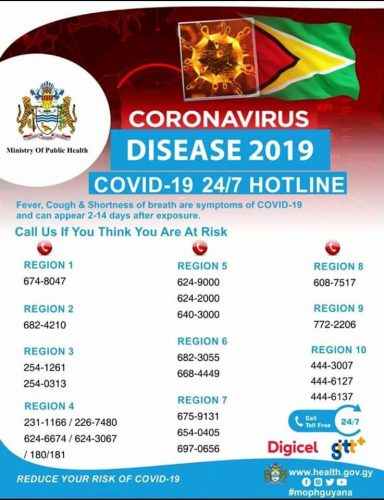As the number of positive novel coronavirus disease (COVID-19) cases in Guyana continues to rise, the caretaker government yesterday announced that the distribution of relief hampers to the vulnerable has been suspended as the Civil Defence Commission (CDC) is being reorganised to improve its response to the pandemic.
The number of confirmed positive COVID-19 cases stood at 57, inclusive of six deaths, up to last evening, de facto Minister of Public Health Volda Lawrence revealed during a live update yesterday.
Lawrence said that 60 persons have so far been tested, with 203 persons testing negative for the virus. Nine persons so far have recovered from the disease. She added that 14 persons are currently in institutional quarantine and 42 in institutional isolation while four persons are patients at the COVID-19 Intensive Care Unit (ICU).
 As she gave statistics, Lawrence said that of the 57 recorded cases, four of those persons are known to have had a travel history whereas the other 53 persons contracted the virus in Guyana. Out of the confirmed cases, she reiterated that over 80% of those persons are from Region Four. It was noted that though most of the persons who tested positive for the virus are male, both males and females in the over 50 age group are almost equally affected.
As she gave statistics, Lawrence said that of the 57 recorded cases, four of those persons are known to have had a travel history whereas the other 53 persons contracted the virus in Guyana. Out of the confirmed cases, she reiterated that over 80% of those persons are from Region Four. It was noted that though most of the persons who tested positive for the virus are male, both males and females in the over 50 age group are almost equally affected.
The first case was recorded on March 11.
Meanwhile, Director General of the Ministry of the Presidency Joseph Harmon yesterday said the role of the CDC will be expanded to cater for the long term support of citizens who may be considered vulnerable during this time.
At a press conference, Harmon acknowledged that the CDC is an organization that responds to emergencies, albeit usually on a short terms basis. However, he noted that COVID-19 is different as it is likely to be a long-term matter.
Following a meeting of the National COVID-19 Task Force (NCTF), he said, arrangements would be put in place for the further distribution of items and also the distribution of “cheques or food vouchers”. He further stated that following the meeting the task force was of the view that COVID-19 may be a long-term matter and therefore a one-time distribution of items to some communities will not suffice. Additionally, he said that it was thought best to look at the situation at hand in a strategic way to cater for the long term.
Against this background, Harmon said the distribution of hampers in the way that it was done previously by the CDC was suspended and that items that are currently at the Commission’s facility for distribution would be distributed under new guidelines as a different system will have to be put in place. “A system that identifies who are the vulnerable in our society. In the past, we have used certain lists to determine who are the persons who are vulnerable but in this pandemic we have a situation in which people who were not vulnerable before the pandemic but have become vulnerable now,” Harmon stated as he gave examples as persons who lost their livelihoods as a result of the restrictions on the assembly of persons and persons who have been dismissed from their jobs.
“We have set up a database, which will allow for persons who are affected to register on that database,” he further said, while adding that the information will be forwarded to the Ministry of Social Protection for checks to be made in order to ensure that persons “satisfy those requirements” and a determination will then be made on who receives a “care package” or who receives vouchers. It was further stated that they are hoping to employ a more scientific approach for the distribution and to increase the capacity of the CDC for the long term.
Harmon stated that from looking at Guyana’s COVID-19 figures, “the curve” is going in an upward direction and therefore measures should be taken to flatten the curve. He added that with comparisons to countries within the region, it appears as though Guyana is moving in the wrong direction. He noted that it would appear as though Guyana will be subjected to COVID-19 restrictions going into 2021 even as some other countries have projected that they may have to go into 2022.
The government has faced criticism for not dealing aggressively with contact tracing and testing after the first imported COVID-19 case.






